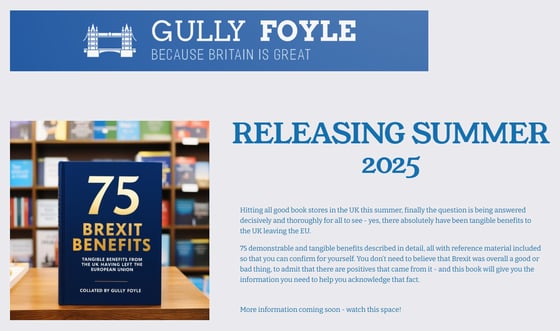

Gully Foyle DEBUNKED
Gully Foyle, someone on Twitter, has maintained a list of "75 Brexit Benefits". The list has gained traction over the last couple of years - even reported in The Express as fact.
Gully already grifts begging for you to 'buy a coffee' but now is getting on a grift with the list compiled of mostly other people's research by releasing a book containing the list in Summer 2025.
This list is debunked in many places online, including even with community notes on Twitter under many of the points themselves. We thought we'd debunk the list here, all in one place.
But we're going one better than that. We will publish a counter book, in Summer 2025 - "75 Brexit Benefits: Debunked". The difference being, we're not grifters! Any profit made from the sales of our book will be donated to non-profit, pro-European causes and campaigns.
Before we begin...
When you see the amount of money 'saved' in the various 'benefits' below, it is important to always put them in context of how much Brexit has cost us.
A 'benefit' can ONLY be considered a benefit if it, you know, benefits the UK.
Just because something has been done that couldn't be done as a member of the EU, does not make it a 'benefit' if it does not actually benefit the UK.
And once again, any 'benefit' below HAS to always be put in context of how much Brexit has cost us.
Amount it cost to conduct the referendum
£129 million / one off
CBI report, UK's net benefit of EU membership
£73-£91 billion / year
London Assembly report, Loss to UK economy due to Brexit
£140 billion (as of 2023)
Finally, Brexit is not 'done' contrary to popular belief. Every time work is done to continue the enactment of Brexit, money is spent. From hiring teams of negotiators to teams of administrators and law firms to write legislation.
There are currently no figures for these costs, as the government from 2016 to the current government refuse to calculate them and publish them for the public to see. Wonder why? We are working on a petition on the parliament petition website and a freedom of information request to find this out.
For daily reports about the damage Brexit is doing to the UK, bookmark the 'Brexit Carnage' website here...
Got any questions about Rejoining the EU while you are here? Then ask away on the Rejoin.info website from StayEuropean.org here...
"The narrative is presented in a way that highlights perceived benefits of leaving the EU, but it oversimplifies or ignores important complexities, particularly regarding the economic impact, trade relationships, and the broader geopolitical context. While certain claims about revenue retention and regulatory independence may hold some truth, they ignore the broader trade-offs that Brexit entails, including economic disruptions and diplomatic challenges."
Chat GPT Summary of Gully's 75 "Brexit Benefits"
Roadmap
Work began work on debunking the list on 14th May 2025.
10 on the list will be debunked each week until complete.
After completion, a foreward and index will be written for the book.
We will then self publish the book, digitally and in-print, for Summer 2025.
1-10 > 16th May 2025 > COMPLETE
11-20 > 23rd May 2025 > COMPLETE
21-30 > 30th May 2025 > COMPLETE
31-40 > 6th June 2025
41-50 > 13th June 2025
51-60 > 20th June 2025
61-75 > 27th June 2025
© 2025. All rights reserved.
Website created by
NATIONAL REJOIN MARCH
www.MarchForRejoin.co.uk